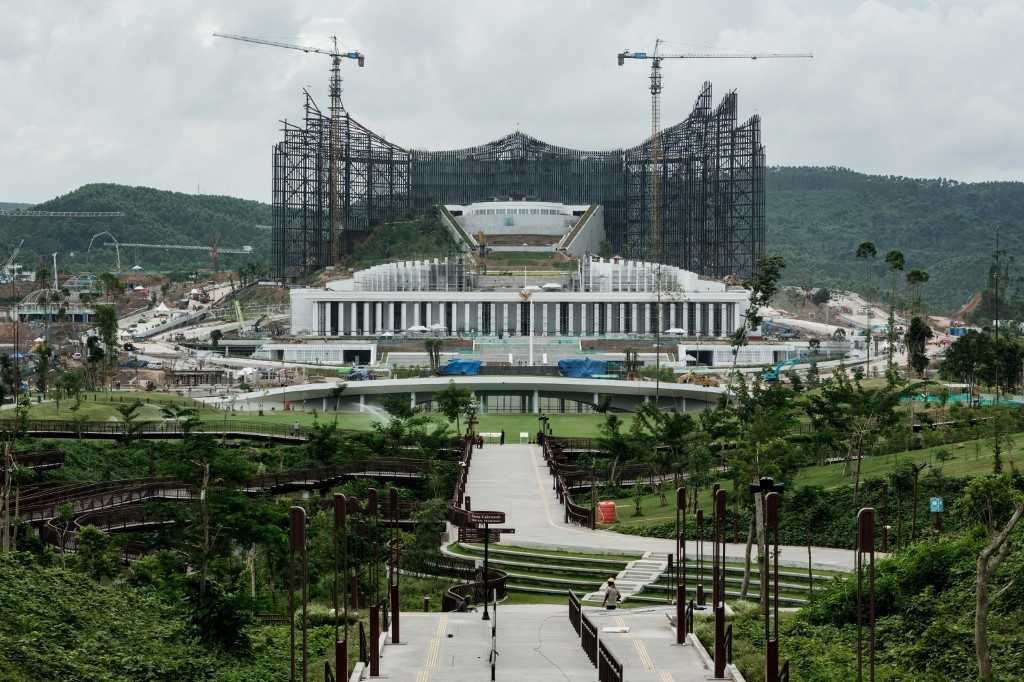News
The curious case of IKN’s forgotten development
Tenggara Strategics July 24, 2025 Work continues on Indonesia's new Presidential Palace in the future capital city of Nusantara, in Penajam Paser Utara, East Kalimantan, on July 11, 2024. The new city is scheduled to begin operating as the country's new political center on Aug. 17, 2024, during Indonesia's 79th Independence Day. Work continues on Indonesia's new Presidential Palace in the future capital city of Nusantara, in Penajam Paser Utara, East Kalimantan, on July 11, 2024. The new city is scheduled to begin operating as the country's new political center on Aug. 17, 2024, during Indonesia's 79th Independence Day. (Photo by Yasuyoshi CHIBA/AFP) (AFP/Yasuyoshi Chiba)
Work continues on Indonesia's new Presidential Palace in the future capital city of Nusantara, in Penajam Paser Utara, East Kalimantan, on July 11, 2024. The new city is scheduled to begin operating as the country's new political center on Aug. 17, 2024, during Indonesia's 79th Independence Day. Work continues on Indonesia's new Presidential Palace in the future capital city of Nusantara, in Penajam Paser Utara, East Kalimantan, on July 11, 2024. The new city is scheduled to begin operating as the country's new political center on Aug. 17, 2024, during Indonesia's 79th Independence Day. (Photo by Yasuyoshi CHIBA/AFP) (AFP/Yasuyoshi Chiba)
The first phase of Nusantara Capital City (IKN) development has officially concluded, with the IKN Authority confirming it will receive Rp 48.8 trillion (US$3 billion) from the state budget to continue the project’s second phase through 2028. Although President Prabowo Subianto initially pledged to begin working from IKN starting August 2028, uncertainty looms, as he has yet to demonstrate genuine interest in relocating the nation’s capital.
Despite publicly promising to continue the project, Prabowo’s actions suggest otherwise. Most recently, he decided to host Indonesia’s 80th Independence Day celebration next month in Jakarta, rather than in IKN. Last year, former president Joko “Jokowi” Widodo held the event at IKN, attended by 1,400 guests.
Prabowo’s skepticism of IKN is not new. While serving as defense minister under Jokowi, he once described the project as a waste of state funds. Yet, to reassure investors after the first cabinet meeting in IKN in 2024, Prabowo vowed not only to continue its development but to complete it within four to six years, significantly shorter than the original 10- to 20-year timeline.
Since taking office, however, Prabowo has prioritized his flagship programs: food self-sufficiency, energy resilience, downstream industries, and especially his free nutritious meals program. These priorities have left IKN development with what appears to be half-hearted support. Nonetheless, Prabowo’s political alliance with former president Jokowi compels him to nominally support the project after Jokowi’s departure from office.
Fiscal constraints further complicate the situation. In the first half of this year, the budget deficit widened to 0.8 percent of GDP, up from 0.34 percent during the same period last year, approaching the full-year target of 2.53 percent. While Prabowo has issued instructions for government-wide spending cuts, declining tax revenues have exacerbated the problem. The Finance Ministry has even released Rp 149 trillion in previously blocked funds to finance Prabowo’s priority programs.
With Rp 171 trillion allocated for the free meals program this year – far above the initial Rp71 trillion budget – fiscal space to fund basic public services like health and education has tightened. Infrastructure spending has been among the hardest hit. Following the budget adjustments, the Public Works Ministry’s budget rose to Rp73.76 trillion, still significantly below the original Rp110 trillion allocation. This shortfall directly impacts IKN development.
From the outset, the government envisioned that the state budget would cover only 20 percent of IKN’s total projected cost of Rp 466 trillion, with the rest coming from state-owned enterprises and private investors. However, nearly Rp 90 trillion had already been spent from public funds between 2022 and the end of 2024. Private investment remains minimal and largely driven by domestic investors previously courted by Jokowi. Incentives such as 180-year land-use rights (HGB) have done little to attract substantial foreign capital.
According to the IKN Authority, 598 Letters of Intent (LoIs) from potential investors have been received. Yet most remain unverified, casting doubt on their seriousness. Of the verified commitments, 36 come from Chinese investors, promising Rp70 trillion in investment. However, most of these are tied to public-private partnership (PPP) projects, which still require government funding.
Another growing concern is the maintenance of infrastructure already built. IKN is estimated to need Rp 300 billion annually for maintenance alone, but responsibility for managing these assets, including the new toll road to IKN, remains unresolved.
With the project’s future uncertain, the planned relocation of 60,000 civil servants in September 2024 has yet to materialize. Key supporting infrastructure, such as digital systems and basic furnishings for housing units, remains unfinished. The government has once again postponed the relocation, without providing a clear timeline. Currently, only employees of the IKN Authority reside in the new capital.
Taken together, these developments suggest that Prabowo himself remains unsure about IKN’s future. Whether he will eventually celebrate the Independence Day and relocate his office to IKN in August 2028 remains an open question.
What we've heard
According to a source, former IKN Authority Head Bambang Susantono once said in a meeting that the difficulty in attracting investors for the development of the IKN was the lack certainty in delivering profits for them. “Investors are recalculating how much profit they can actually gain from the project,” the source said.

